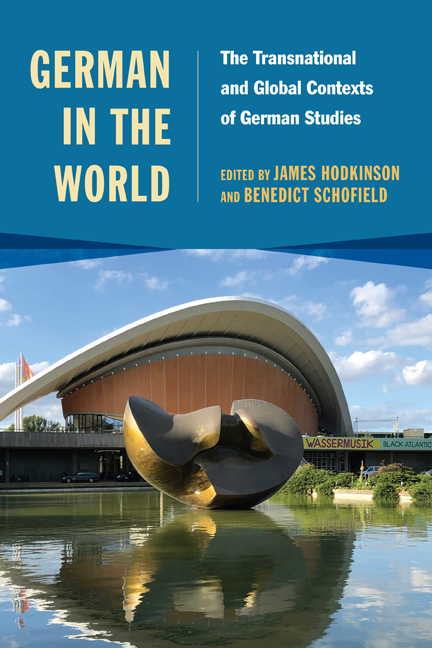Introduction: German in Its Worlds
Published online by Cambridge University Press: 06 October 2020
Summary
WHAT IS THE STATE of German studies as an academic discipline in its national and global contexts as we move deeper into the twenty-first century? What future does it face, how does this relate to its past, and how are Germanists of diverse origins and persuasions around the world responding to such issues? These questions form the nexus of this volume. They are questions that demand we consider even larger topics: not just the status of our discipline but of interdisciplinarity as a model for the arts and humanities; not just the role of the canon but the decolonization of that canon; and not just the linguistic and geographic boundaries that we have traditionally used to contour German studies but also the temporal and disciplinary boundaries we use to determine (and limit) the scope of our work as Germanists. However influential in the world the German-speaking nations have been, and might still be, German language and culture, and their academic study, increasingly seem to be at the mercy of tectonic shifts (some required and sought, others not)—from changes in the way our universities are structured and funded to the reshaping of cultural and political discourse under the geopolitical forces of nationalism and globalization.
The question of how we can define and evaluate a specifically German- language culture in such a global context is thus a fraught one. In the wake of the so-called global financial crisis of 2008, and also of large migrational population shifts that saw communities moving in truly unprecedented numbers to cross borders into safer and more prosperous territory, driven by war, famine, and poverty, positively connoted narratives of globalization have fallen out of favor in many quarters. As the former British Prime Minister Theresa May's 2017 comment that “a citizen of the world is a citizen of nowhere” demonstrates, global thinking has been increasingly rejected in favor of resurgent nation-centered thinking. In the United Kingdom, the 2016 European Union Membership Referendum rapidly became about much more than Europe’s future, and “Brexit” developed into a protest vote against globalization and its manifestations.
- Type
- Chapter
- Information
- German in the WorldThe Transnational and Global Contexts of German Studies, pp. 1 - 14Publisher: Boydell & BrewerPrint publication year: 2020



